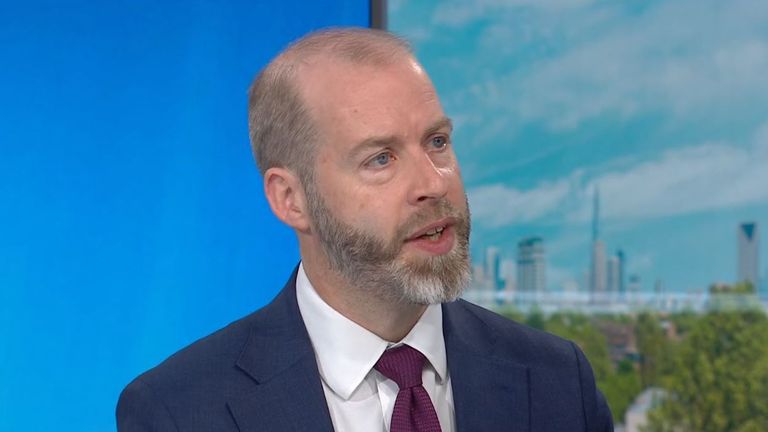Labour welfare cuts ‘Dickensian’ and ‘from another era’, says rebel MP ahead of vote


The Labour MP leading the effort to defeat the government’s welfare bill has described her party’s cuts as “Dickensian” and “from another era”.
Rachael Maskell urged her colleagues to vote against Sir Keir Starmer’s bill, saying it was “far from what this Labour Party is for: a party to protect the poor”.
Politics latest: Starmer facing key vote on welfare reforms
Ms Maskell is one of 39 Labour MPs who have signed an amendment to the Universal Credit and Personal Independence Payment Bill, which, if passed, would halt its progress through parliament.
The leading rebel, whose constituency is York Central, said the bill should be voted down later this evening.
She warned that 600 people took their lives under the era of Tory austerity, adding: “The tragedy of this ideology could be worse.”
Thirty-nine MPs have so far signed Ms Maskell’s amendment despite the prime minister offering significant concessions on his original plans to avoid a damaging rebellion.
The number is a significant drop from the 127 Labour MPs who last week signed a separate amendment that would have killed the legislation and delivered a severe blow to Sir Keir’s authority if it passed.
In an attempt to minimise the looming rebellion, the prime minister watered down his original welfare proposals to minimise the impact on existing claimants.
On Monday, Work and Pensions Secretary Liz Kendall confirmed that all existing claimants of the personal independence payment (PIP), the main disability benefit, will be protected from changes to eligibility, which had been tightened under the original plan.
She also confirmed that all current recipients of the health element of Universal Credit, as well as any new applicants meeting the “severe conditions criteria”, will now have their incomes protected in real terms.
Previously, the government had planned to freeze the UC health top-up at £97 a week during this parliament.
Ms Kendall also promised that a consultation into PIP – “co-produced” with disabled people – will be published next autumn, which was a key demand of the rebels.
Analysis by the government published on Monday revealed the new welfare offer would still push 150,000 more people into poverty by 2030 – down from the 250,000 estimated under the original plan.
Ms Kendall said the U-turn on welfare cuts will cost taxpayers about £2.5bn by 2030 – less than half the £4.8bn the government had expected to save with its initial proposals.
👉Listen to Politics at Sam and Anne’s on your podcast app👈
The fresh amendment signed by the 39 Labour MPs calls for the bill to be dropped over concerns that there has not been a proper, formal consultation with disabled people – and the additional employment support funding will not be in place until the end of the decade.
Some MPs have also expressed concerns that the bill would create a two-tier benefits system that treats existing claimants and new claimants differently.
Sarah Owen, the Labour MP for Luton North and the chair of the Women and Equalities Committee, on Monday questioned whether a “three-tier” benefits system could be created, when taking into account the fact that a government review is being carried out into the PIP assessment system by minister Stephen Timms.
Read more:
Culture secretary hits out at BBC over Glastonbury controversy
Starmer urged to establish Ukraine-style visa for Gazans
Please use Chrome browser for a more accessible video player
11:14
Govt in ‘stronger position’ after welfare changes
Her concerns were echoed by Labour MP Emma Lewell, who said the government’s promised review into PIP -which is not due to report back until November 2026 – was “starting to look a little bit predetermined”.
She also said “a vote for this bill today is a vote to plunge 150,000 people into poverty and to tighten eligibility criteria for those who need support the most”.
Comparing it to the Conservative welfare reforms, she said she and her fellow MPs were being “asked to vote blind today”, with insufficient time for scrutiny and no formal consultation with disabled people.
“Constituents will never forgive, and it will haunt those MPs who voted for it,” she added.
Speaking during the second reading Commons debate on Tuesday, Ms Kendall defended pressing on with welfare changes pending the outcome of the Timms review into the PIP assessment process.
The review, which will look at the PIP assessment process and the criteria for being awarded PIP, will be published at roughly the same time as the changes come into force, from November 2026.
Defending the timings, Ms Kendall told MPs the review was a “major undertaking that will take time to get right, especially if we co-produce it properly”.
She said any changes from the review “will be implemented as soon as is practicably possible”, and that after any changes are made, existing PIP claimants will be able to ask for a reassessment.